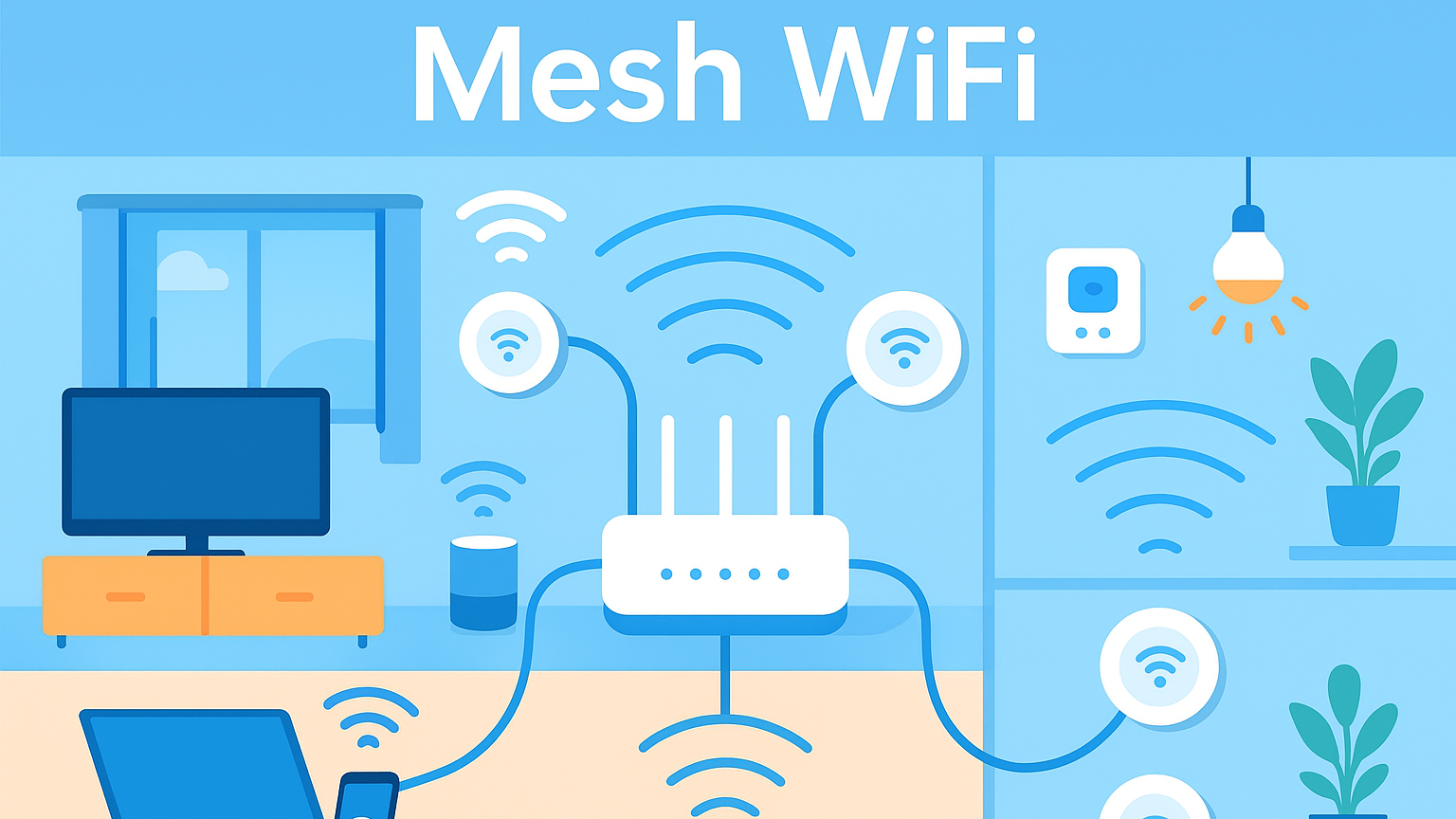Intoduction
A fast and stable internet connection is now essential in every home and workplace. We rely on WiFi for streaming movies, gaming, remote work, and smart home devices. However, traditional routers often have a hard time delivering strong signals in larger homes or multi-story buildings. This is where Mesh WiFi becomes useful.
This article will explain what Mesh WiFi is, how it works, its pros and cons, and whether it suits your internet needs.
What is Mesh WiFi?
Mesh WiFi is a wireless networking system that uses multiple devices, called “nodes” or “satellites,” to deliver uninterrupted internet coverage throughout your home or office. Rather than depending on a single router, mesh systems form a network where each node talks to the others. This setup ensures strong and steady WiFi in every area.
You can think of it like swapping one big speaker for several smaller ones placed around your house. The outcome is clear coverage without any dead zones.
How Does Mesh WiFi Work?
In a traditional WiFi setup, one router sends signals to connected devices. The farther you are from the router, the weaker the connection becomes. Walls, furniture, and multiple floors can worsen this issue.
Mesh WiFi solves this by creating a “mesh network.” Here’s how it works:
- Main Node: Connected directly to your modem.
- Secondary Nodes: Placed around your home to extend coverage.
- Communication: Nodes talk to each other and to the main node, choosing the fastest path for data.
This system lets your devices switch automatically to the nearest node without disconnecting. This way, you get uninterrupted connectivity as you move around.
Benefits of Mesh WiFi
Mesh WiFi offers several advantages compared to traditional routers and range extenders:
1. Eliminates Dead Zones
You no longer need to worry about weak signals in the basement, upstairs bedrooms, or garage.2. Seamless Roaming
As you move through your home, your device connects to the nearest node without any interruptions.3. Scalable Coverage
You can easily add more nodes to expand coverage. This is perfect for large homes, offices, or outdoor areas.4. Simple Setup and Management
Most mesh systems come with mobile apps that make installation and control easy. You can monitor devices, run speed tests, and even pause WiFi for specific users.5. Improved Speed and Reliability
Unlike range extenders, mesh nodes don’t simply repeat the signal. They work together smartly to keep speed high and minimize congestion.Drawbacks of Mesh WiFi
While Mesh WiFi is powerful, it’s not perfect. Here are some potential downsides:
- Higher Cost: Mesh systems are generally more expensive than single routers.
- Overkill for Small Spaces: If you live in a small apartment, a traditional router may be enough.
- Learning Curve: While apps simplify setup, managing multiple nodes might feel overwhelming to some users.
Differences Between Mesh WiFi and Traditional Routers
Mesh WiFi
- Provides whole-home coverage by using multiple nodes.
- Eliminates dead zones and weak signals in larger spaces.
- Easily scalable — you can add more nodes anytime.
- Offers seamless roaming, so devices connect automatically to the nearest node.
- Delivers stronger, more reliable connections for multiple users and devices.
- Managed through simple mobile apps with features like parental controls and device monitoring.
- Best suited for large homes, multi-floor buildings, and offices.
Traditional Routers
- Coverage is limited to the range of a single router.
- Signal weakens with distance, walls, or multiple floors.
- Has a fixed range; extending requires separate range extenders. Roaming is less seamless, often causing interruptions when moving between router and extenders.
- More affordable and budget-friendly option.
- Performance can slow down if too many devices are connected.
- Setup is straightforward but advanced settings may require technical knowledge.
- Best suited for small apartments, single rooms, or compact spaces.
When Should You Consider Mesh WiFi?
You might want to switch to Mesh WiFi if:
- Your home is larger than 2,000 sq. ft. You experience frequent dead zones or weak signals.
- You use many smart home devices spread throughout the house.
- You want easy network management via an app.
- You share WiFi with multiple users who stream, game, or work online simultaneously.
FAQs About Mesh WiFi
1. Is Mesh WiFi better than a router?
Yes, mesh WiFi is a good choice for larger spaces. It offers better coverage and smooth roaming, unlike a single router. However, in smaller homes, a traditional router may be enough.
2. Do I need the internet for Mesh WiFi to work?
Yes, mesh WiFi spreads your current internet connection; it does not replace your internet service.
3. How many nodes do I need?
Most homes do well with 2 to 3 nodes. Larger properties might need more for complete coverage.
4. Does Mesh WiFi increase internet speed?
Mesh WiFi does not increase your provider's speed, but it helps distribute that speed evenly throughout your home, which reduces weak spots.
5. Can I use Mesh WiFi with my existing router?
Yes, many systems let you connect the main node to your existing modem-router setup, but it works best as a full replacement.
6. Is Mesh WiFi secure?
Yes, modern mesh systems come with strong encryption, guest networks, and automatic updates to keep your network safe.
Final Thoughts
Mesh WiFi is a dependable option for any individual facing multiple coverage and dead zone issues in their home or office. These systems allow for multiple nodes to provide consistent connectivity across all devices and is especially useful in a home using a rural wireless internet service provider (WISP) where signal strength can often fluctuate based on location and time of day.
While it may be pricier on the front end, the advantages of seamless roaming capabilities, scalability, and ease of network management make Mesh WiFi a good option for the current connected universe we live in. Having high-speed, dependable internet connectivity in your entire home when you are working, streaming or gaming is paramount.









